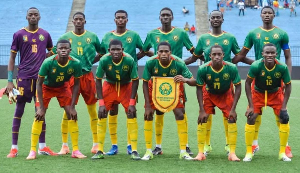Prof Narcisse Mouelle Kombi has delved into the fascinating evolution of the democratisation process in Cameroon. The books will be published this Monday August 19, 2013.
Another publication on political analysis in Cameroon will today hit the book shelves. Even before it is made public, those who have had the privilege to read the book have described it in flourishing terms looking at the contribution that the book makes to the political evolution of the country under President Paul Biya.
When President Paul Biya said in an interview to Yves Mourousi of Radio Monte-Carlos in 1991 that he will like to be remembered as the one who brought democracy and prosperity to his country, many doubted what the Head of State meant. Such doubts were understood because the wave of protests for democratic freedom and liberty with the clarion calls for the Sovereign National Congress were rife across Africa. Cameroon was no exception.
However, President Paul Biya took on his responsibilities as Head of State to define the democratisation options that he thought were good for the country. Some critics were quick to talk of an attempt to domesticate democracy in Cameroon in violation of universal principles. Yet, none of them ignored the diversified and complex nature of Cameroon which is often referred to as 'African in miniature'. With a highly Muslim north that harbours a strong Christian population, a Christian south and an Animist West which equally has an impressive Muslim population. Added to such diversity is the existence of over 200 national languages and micro-ethnic groups that are all competing for equal recognition within the Republic.
Handling the mantle of power within such a State cannot objectively avoid options that would call for varied analysis and even criticisms. Thus, those who have had occasion to question the legitimacy of power, the values or importance of freedom in Cameroon, the democratisation drive in the country and/or the modernisation of the State machinery in Cameroon can invariably turn to Professor Narcisse Mouelle Kombi's book for a response. Entitled; "La démocratie dans la réalité camerounaise: liberté, légitimité et modernité politique sous Paul Biya, » the book has been qualified by most critics as a refined document that carries an intelligible, balanced, and an informed analysis of Cameroon under the stewardship of President Paul Biya.
Published by edition Dianoïna in Paris France, the book looks at the different strides that Cameroon has made under President Biya: the early life of the regime, progress made over the years as nurtured by President Paul Biya, judicial and institutional changes that have occurred in Cameroon during the last three decades, efforts to reinforce electoral transparency through the putting in place of the various structures to manage elections, as well as the protection of human rights in Cameroon and so on.
The author also points out that the strides made by Mr Biya in ensuring democratic and institutional progress in Cameroon have invariably been accompanied by a marked determination to ensure development and an improvement in the living standards of the population. Thus, even the most avid critic of the Biya regime will not hesitate on concurring that peace and stability which are sine quo none to development have been some of the pillars on which President Biya has pegged his national policies.
These are all values which Professor Mouelle Kombi has encapsulated in his work. Narcisse Mouelle Kombi, is not only a Public Law Specialist and Political Scientist, but has equally written other books like; La Politique étrangère du Cameroun (L'Harmattan, 1996) and La guerre preventive et le droit international (Dianoïa, 2006). He was Dean of the Faculty of Law and Political Science at the University of Douala and the Director of the International Relations Institute of Cameroon (IRIC), member of the National Commission on Human Rights and Freedoms.
Opinions of Monday, 19 August 2013
Auteur: Cameroon Tribune














